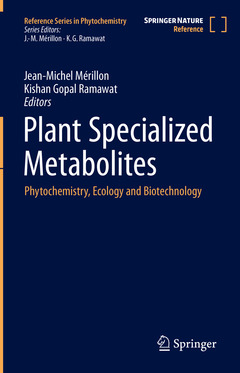Plant Specialized Metabolites, 1st ed. 2025 Phytochemistry, Ecology and Biotechnology Reference Series in Phytochemistry Series
Coordonnateurs : Mérillon Jean-Michel, Ramawat Kishan Gopal

This book offers a comprehensive and authoritative review of the biological and ecological roles played by specialized metabolites (secondary metabolites) in the life cycle of plants, and it also covers the latest biotechnological advances in metabolite production and various industrial applications.
Divided into three parts, the book starts with an outline of the diverse biological effects of specialized metabolites on plant-microbe and plant-insect interactions, soil health, reproduction, and human welfare. In this first part, readers will find topics such as the antimicrobial potential of specialized metabolites, the use of fucoidan in cancer therapy, the use of plant specialized metabolites in aromatherapy, the role of tannins in cardiovascular diseases, a pharmacological perspective on isoflavones and noncommunicable diseases, algal secondary metabolites, and plant specialized metabolites used as aphrodisiacs. In Part II, chapters present an overview of the ecological roles played by plant specialized metabolites in pollination, plant defence, agriculture and weed management, among others. In the third and final part of this book, readers will discover the latest biotechnological approaches for bioactive compound production and identification, including the discovery of bioactive specialized metabolites based on metabolomic approaches, and a perspective on the industrial applications of plant specialized metabolites.
Given its breadth, this book is of interest to botanists, biotechnologists, phytochemists, industrialists, environmentalists, biologists and all those involved in the production and use of secondary/specialized metabolites.
Jean-Michel Mérillon is a Professor at the Faculty of Pharmacy, University of Bordeaux, France and is currently leading the study group on biologically active plant substances at the Institute of Vine and Wine Sciences, which comprises 25 scientists and research students. The group has been working on phenolic compounds from vine and wine for many years, mainly complex stilbenes and their involvement in health. Prof. Mérillon has supervised the doctoral theses of 20 students. He is involved in developing teaching on plant biology, natural bioactive compounds, and biotechnology. Prof. Mérillon has published 150+ research articles in internationally recognized journals, and has co-edited books and reference works on secondary metabolites and biotechnology. In 2004, he founded the technology transfer unit “Polyphenols Biotech,” providing support for R&D programs for SMEs and major groups from the cosmetic, pharmaceutical, agricultural, and health-nutrition sectors.
Kishan Gopal Ramawat is a former Professor and Head of the Botany Department, M.L. Sukhadia University, India, with longstanding research experience. He received his Ph. D. in Plant Biotechnology in 1978 from the University of Jodhpur, India, and afterward joined the university as a faculty member. In 1991 he moved to the M.L. Sukhadia University in Udaipur as an Associate Professor and became a Professor in 2001. He served as the Head of the Department of Botany (2001–2004, 2010–2012); was in charge of the Department of Biotechnology (2003–2004); was a member of the task force on medicinal and aromatic plants of the Department of Biotechnology, Government of India, New Delhi (2002–2005); and coordinated UGC-DRS and DST-FIST programs (2002–2012). Prof. Ramawat had done his postdoctoral studies at the University of Tours, France, from 1983 to 1985, and later returned to Tours as visiting professor (1991). He also visited the University of Bordeaux 2, France, several times as
Offers a comprehensive review of plant specialized metabolites
Covers various specialized metabolites’ biological and ecological roles
Explores the latest advances in specialized metabolite production and identification
Ouvrage de 1300 p.
15.5x23.5 cm
Thèmes de Plant Specialized Metabolites :
Mots-clés :
Plant secondary metabolites; Biological role of Specialized Metabolites; Medicinal Plants; Ecological role of Specialized Metabolites; Plant Defense; Weed management; Bioactive compounds production; Flavinoids production; Metabolomics for bioactive specialized metabolites discovery; Antibacterial activity of plant specialized metabolites; Antifungal activity of plant specialized metabolites; Application of fucoidan in cancer therapy; Tannins role in cardiovascular diseases; Specialized metabolites application as aphrodisiacs; Bioactive compounds from cyanobacteria; Transgenic Plants; Phytochemistry



